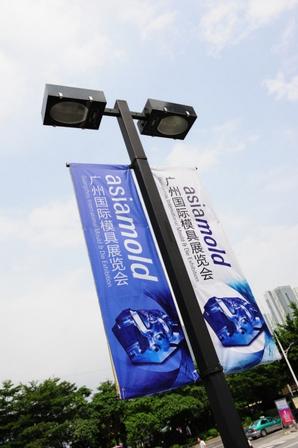By Kent Miller
CORRESPONDENT
By Nina Ying Sun
ASSISTANT MANAGING EDITOR
Published: September 19, 2014 2:07 pm ET
Updated: September 19, 2014 2:11 pm ET

Image By: AsiaMold
Rising interest in 3-D printing led to a special section for the process at this year's AsiaMold.
GUANGZHOU, CHINA — While the much-ballyhooed technology of 3-D printing landed a special section at this year’s AsiaMold show in Guangzhou, most of the gear on display was targeted at niche markets such as fine arts or dental work.
An exception in the crowded field of boutique vendors and agents for foreign-made ABS gear was Changsha-based Hunan Farsoon Hi-tech Co. Ltd., whose nylon-based selective laser sintering systems have applications in industrial-strength prototyping.
“Nylon is stronger and has a higher melting point than regular plastics. It’s much more durable than [ABS],” said Shenzhen sales manager Tony Wu. “It’s better for industrial use.”
Founded in 2009 by industry veteran Xu Xiaoshu with a mixture of funding from domestic investors and government incentives, Farsoon now boasts of being third in the nylon 3-D printing field, behind USA pioneer 3D Systems Inc. and Germany’s EOS GmbH.
The company also claims on its website to be the world’s second company to produce selective laser sintering nylon materials, after Germany’s Evonik AG, as well as the only company in the world that offers the complete industry chain of SLS technology from manufacturing equipment to production materials and processing services.
The key appeal of Farsoon’s selective laser sintering devices is cost. Compared to 3D Systems offerings, “our printers are more than 30 percent less,” Wu said.
The company said it has sold the equipment to the U.S. and exported the nylon powder to the U.S., Sweden, Italy and other foreign countries.
Formally known as additive manufacturing, 3-D printing is expected to mushroom to a $10.8 billion market by 2021, according to AsiaMold organizer Messe Frankfurt. Still, slow processing speeds remain a key main challenge to even limited production runs.
Farsoon’s Xu recently told a local newspaper in Guangzhou that molds printed by his company’s 3-D system can meet high precision tolerances of 0.05 mm, and with some further processing can reach 0.01-0.02mm, which meets the requirement of some manufacturers.
But he acknowledges the challenges of larger-scale production. It also faces issues of layering multiple materials when it comes to the production of toys and footware, he told Nanfang Daily.
Xu believes 3-D printing experts need to work together with leading players of specific end markets to come up with solutions. He said Farsoon is working with a manufacturer of mobile phone housings in Dongguan to develop 3-D printers and materials that can 3-D print housings.
Xu was also invited by Foxconn Technology Group’s technical committee to give a 3-D printing lecture at Foxconn’s Shenzhen campus late last month. He will be back to Foxconn in November to speak at the company’s annual new technology conference.
Xu served as a director of software for 3D Systems and also worked at DMT Corp. before returning to China to found Farsoon in 2009.
Fueled by China’s growing interest in taking a leading position in 3-D printing, Farsoon is now investing 103 million yuan ($16.8 million) to build a “Polymer complex structure additive manufacturing” national lab that will focus on developing SLS equipment and materials, according to a newly published document by China’s Ministry of Envrionmental Protection.
The facility will feature 11,343 square meters (168,326 square feet) of space and is slated to start operation in January.
The designed annual production capacity includes 100 units of SLS equipment and 220 tons of materials. The materials would be made from nylon and one extra ingredient — glass microbeads, carbon fiber, mineral fiber, stainless steel or alumina.
Farsoon said it will join forces with research partners from the Chinese Academy of Sciences, Shanghai Jiaotong University, Janus (Dongguan) Precision Components Co. Ltd. and Shanghai Fochif Mechatronics Technology Co. Ltd.
Janus is one of China’s top 10 mold makers ranked by a recent report from Qianzhan Business Information Co. Ltd. It also makes electronics components for customers like Samsung and Haiwei. | 